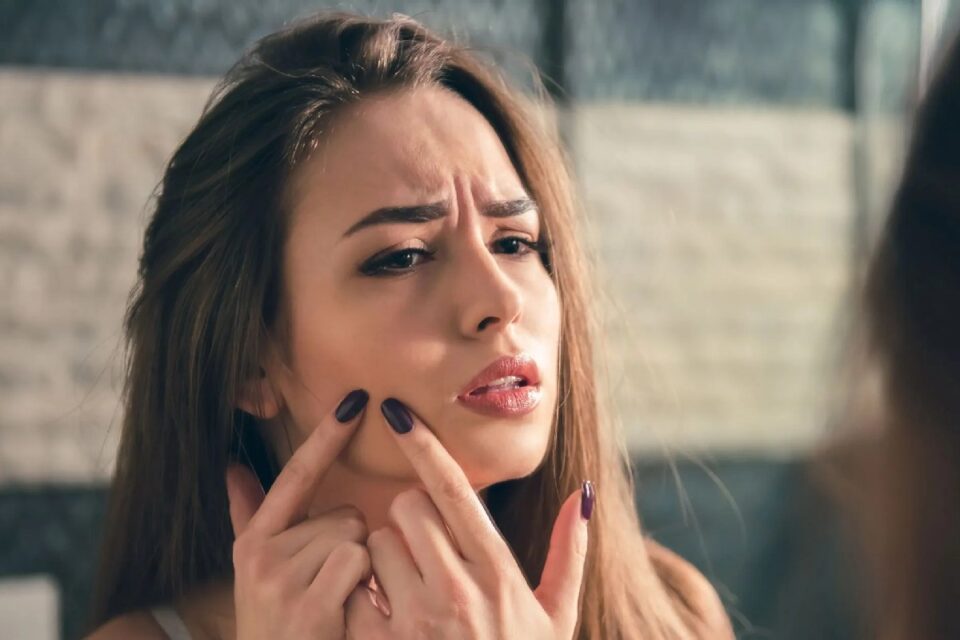Most people affected by acne might not realize that there are different types of acne, and they may not be effectively treating the type they are currently inflicted with; one of the common types of acne is hormonal acne.
Table of Contents
What is Hormonal Acne?
Acne is a well-known skin condition that is caused by the clogging of hair follicles. Hormonal acne is also referred to as acne vulgaris and is a type of acne that develops when there are hormonal changes in the body that increase the amount of sebum that the sebaceous glands release. This oil interacts with bacteria that naturally occur on the skin and results in acne in the pores.
- Whiteheads: Whiteheads are small, skin-colored bumps that can develop on the skin. Because of their color, whiteheads can be difficult to notice.
- Blackheads: This form of acne also appears on the skin but in small black spots.
- Papules: Papules are small bumps that form on the skin that are tender and uncomfortable to the touch.
- Pustules: Pustules are what we commonly refer to as pimples, and they are small bumps on the skin that contain pus.
- Cysts: Sit underneath the skin and small pockets, and they contain pus. They can be tender to touch.
Acne can appear anywhere where there are sebaceous glands, which are in the face, chest, shoulders, and back.
Causes
Several different factors can contribute to hormonal acne.
- Stress
- Pollution
- Picking and squeezing blemishes
- Poor Diet
- Menstruation and ovulation
- Menopause
These factors can fluctuate hormonal levels and increase inflammation in the skin and the production of sebum.
Prevention
Luckily, several methods are available to treat and prevent the formation of hormonal acne.
Traditional Treatments
Some of the traditional methods for treating hormonal acne are:
- Oral contraceptives: Oral contraceptives that contain ethinylestradiol have been used for hormonal acne treatment. The ethinylestradiol is used in combination with one of the following: drospirenone, norgestimate, or norethindrone. Together, they specifically target the hormones that can contribute to acne and prove useful during times when there are peaks in hormones, like ovulation and menopause.
- Anti-Androgen drugs: These drugs work by decreasing the amount of the male hormone androgen in the body. Both men and women naturally develop this hormone, but too much of the hormone can cause acne by interfering with hair follicles and increasing the production of sebum.
- Retinoids: For mild forms of hormonal acne, topical retinoids are often used. Retinoids are derived from vitamin A and are found in lotions, creams, and salves that are available over the counter.
Natural Remedies
Natural remedies are also available for hormonal acne treatment.
- Tea Tree Oil: Applying tea tree oil is one of the more natural ways to treat acne. The oil has anti-inflammatory properties that can decrease inflammation, and it is found in many different skin care products. Tea tree oil should be diluted with a carrier oil like olive oil or coconut oil before use because tea tree oil is very strong.
- Green Tea: Green tea is another popular natural remedy for treating hormonal acne. Like tea tree oil, green tea has anti-inflammatory properties and drinking a few cups a day can help lower inflammation in your skin. Additionally, green tea can be made into a paste and used as a face mask.
Reducing Risk
Besides actually treating acne and its symptoms; there are steps you can take in your life to help reduce the risk of acne forming.
To manage stress in your life, consider developing stress-relieving habits like meditation or yoga.
Try setting a routine sleep schedule and stick to it. Not only will a good night’s sleep help lower stress levels and the chance of developing hormonal acne; but it’ll do wonders for your mood.

